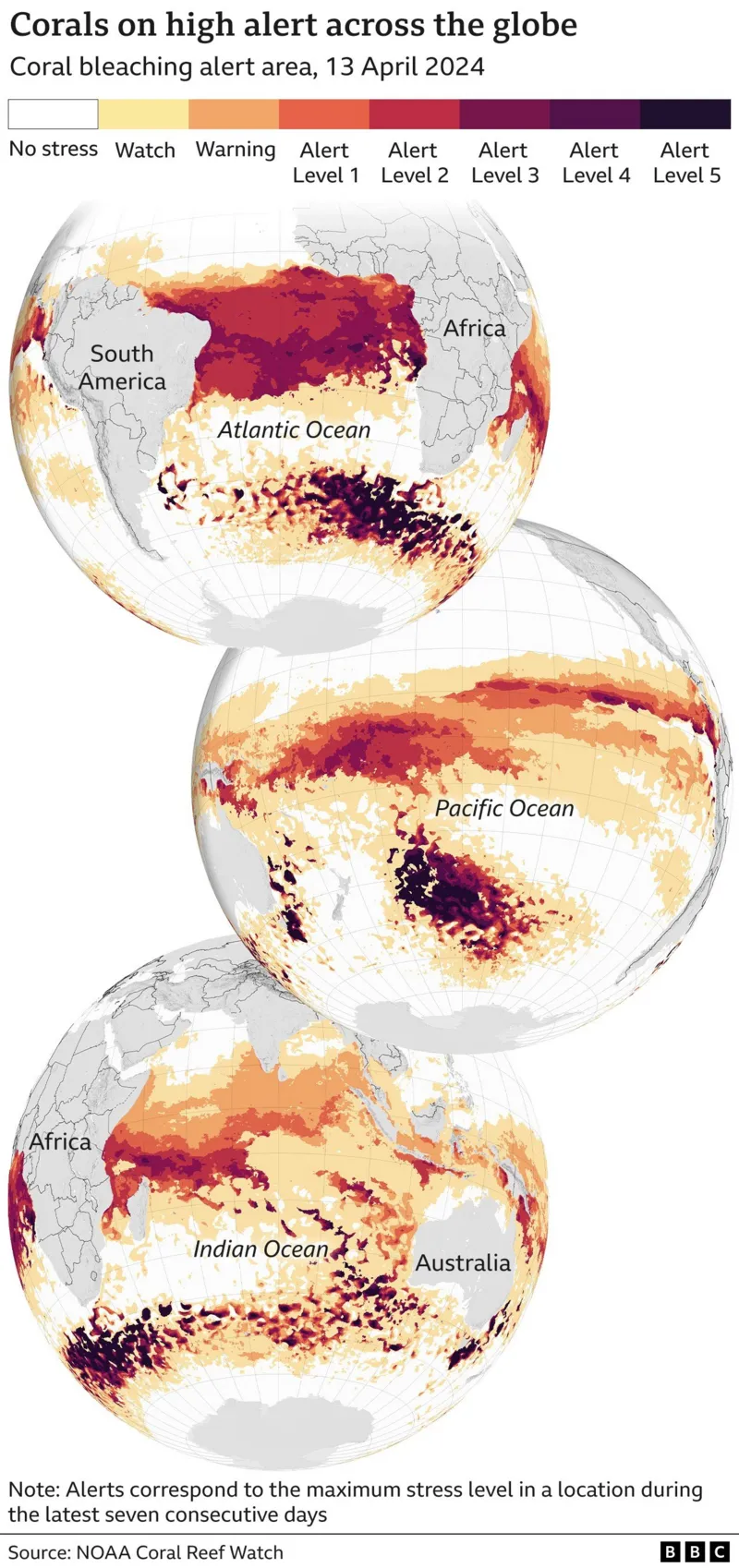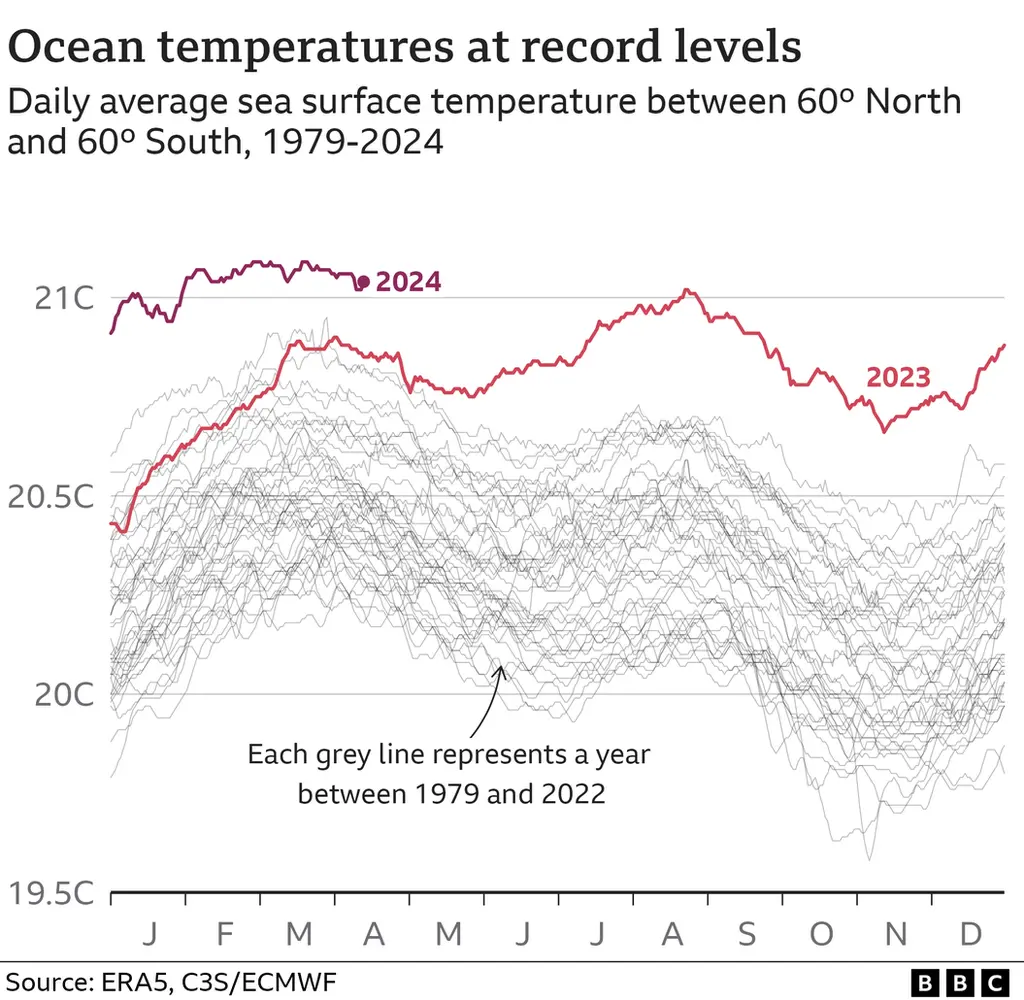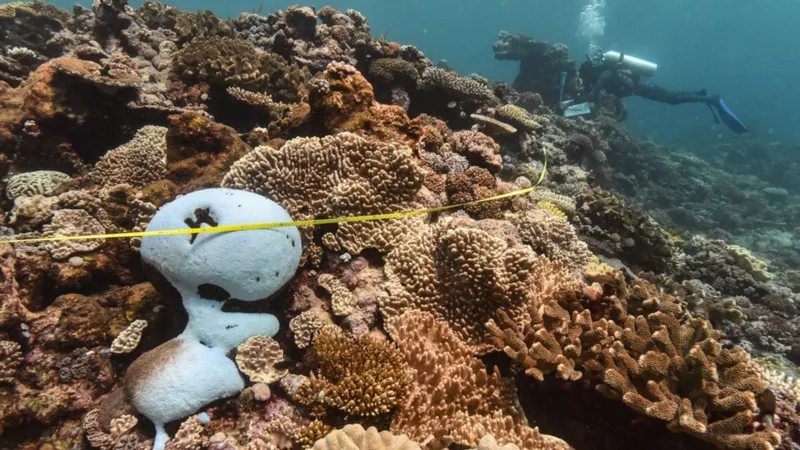World's coral turns white from deadly ocean heat
 Recent record ocean heat has led to widespread coral bleaching and mortality, marking the fourth global mass coral bleaching event, as reported by the US National Oceanic and Atmospheric Administration (NOAA). Coral bleaching occurs when coral becomes stressed due to high water temperatures, causing it to turn white.
Recent record ocean heat has led to widespread coral bleaching and mortality, marking the fourth global mass coral bleaching event, as reported by the US National Oceanic and Atmospheric Administration (NOAA). Coral bleaching occurs when coral becomes stressed due to high water temperatures, causing it to turn white.
Coral reefs are vital ecosystems that support ocean life, fishing industries, and generate significant economic revenue. The current episode of ocean heat has set records for several months, with this being the first global evidence of its impact on marine life.
NOAA confirmed widespread coral stress across all oceans - the Atlantic, Pacific, and Indian - following reports from scientists worldwide. While bleached coral may appear visually striking in photographs, scientists conducting reef dives report observing ill and decaying coral up close.
Researchers from the US, Australia, Kenya, and Brazil have expressed dismay and frustration as they witness the deterioration and loss of coral reefs they hold dear, attributing these changes to warming oceans.
The initial indications emerged in the Caribbean last year when beachgoers discovered that the water off the coast of Florida was as warm as a hot tub. Subsequently, this heat spread to the southern hemisphere, impacting over half of the world's coral reefs. Affected regions include Australia's Great Barrier Reef, coastlines in Tanzania, Mauritius, Brazil, Pacific islands, as well as the Red Sea and Persian Gulf.
In August of last year, the global average ocean temperature reached its highest level on record, and has remained consistently above average nearly every day since then. This increase in sea surface temperatures is primarily attributed to climate change, as the warming gases released from the combustion of oil, coal, and gas are absorbed by the oceans.
The occurrence of El Niño, a natural climate phenomenon, has also played a role in raising temperatures since last June, although there are indications that it is currently diminishing in strength.
During a 10-day period in February, scientist Neal Cantin conducted aerial surveys over the Great Barrier Reef on behalf of Australia's Institute of Marine Science.
Spanning approximately 2,000 kilometers, equivalent to the length of the US east coast, this UNESCO World Heritage site faced unprecedented levels of coral bleaching across all three regions of the Great Barrier Reef Marine Park, according to Dr. Cantin. The severity of bleaching observed is likely to result in significant coral mortality.
Coral plays a crucial role in the ecosystem, often referred to as the "sea's architect," as it constructs expansive formations that provide habitat for approximately 25% of all marine species.
Stressed coral is likely to perish if exposed to temperatures 1°C above its thermal threshold for two months, while it may survive for approximately one month under conditions with temperatures 2°C higher. Once coral dies, it can have cascading effects on marine life, such as fish that rely on coral noise for navigation struggling to find their way home.
Anne Hoggett, a scientist who has been diving at Australia's Lizard Island for three decades, has witnessed widespread bleaching once again since February. Lizard Island, featured in the Netflix documentary "Chasing Coral," has experienced significant bleaching events.
Like many other researchers, Hoggett was initially shocked by the sight of coral turning white during the first mass bleaching event in 1998. However, she now expresses frustration and anger at the recurrence of these events, emphasizing her concern from the Australian Museum's Lizard Island Research Station.
Coral possesses the ability to recover from heat stress, but this process requires time, ideally spanning several years. When weakened, coral becomes more susceptible to diseases and faces a higher risk of mortality. Dr. Emma Camp from the University of Technology Sydney emphasizes that while coral can demonstrate resilience and recovery if provided with the opportunity, the frequency and intensity of bleaching events are increasingly reducing the window for recovery.
Dr. Emma Camp from the University of Technology Sydney emphasizes that while coral can demonstrate resilience and recovery if provided with the opportunity, the frequency and intensity of bleaching events are increasingly reducing the window for recovery.
The most recent global mass bleaching event occurred from 2014 to 2016. Since then, ocean temperatures have risen to the extent that the National Oceanic and Atmospheric Administration (NOAA) had to introduce three new heat alert levels.
Ecologist David Obura, based in Kenya, receives reports from numerous sources, including rangers, scientists, and fishing communities across the Indian Ocean, regarding coral bleaching events. In February, bleaching was observed in Madagascar before spreading to Tanzania and Comoros.
Obura highlights the intimate knowledge fishermen have of coral reefs and their immediate awareness when something is amiss. They are deeply concerned about the future of fishing, as coral degradation disrupts the feeding patterns of fish, ultimately impacting their livelihoods. Recent research published last week offers some optimism, suggesting that coral living in cooler, deeper waters, typically found between 30-50 meters deep in the Great Barrier Reef, may have a better chance of survival as the planet continues to warm. According to Jennifer McWhorter from NOAA, who co-authored the research with the University of Exeter, deeper water coral could potentially withstand global warming of up to 3°C compared to pre-industrial times.
Recent research published last week offers some optimism, suggesting that coral living in cooler, deeper waters, typically found between 30-50 meters deep in the Great Barrier Reef, may have a better chance of survival as the planet continues to warm. According to Jennifer McWhorter from NOAA, who co-authored the research with the University of Exeter, deeper water coral could potentially withstand global warming of up to 3°C compared to pre-industrial times.
However, all the coral scientists interviewed by BBC News emphasized that it's essential to recognize that coral reefs as we currently know them will undergo permanent changes, and small-scale restoration efforts alone cannot preserve coral on a global scale. They stress that only swift and comprehensive reductions in greenhouse gas emissions, effectively curbing ocean warming, can offer any hope of preserving coral reefs.
McWhorter metaphorically likened the transformation of coral reefs from vibrant ecosystems to mere scaffolding, highlighting the diminished habitat value for marine life. Coral reefs serve as early indicators of the broader impacts of a warming planet on natural ecosystems, prompting calls from scientists like Dr. Obura to heed these warnings and apply lessons learned to protect other vulnerable ecosystems.























![[LIVE] Engage2Earn: McEwen boost for Rob Mitchell](https://cdn.bulbapp.io/frontend/images/c798d46f-d3b8-4a66-bf48-7e1ef50b4338/1)
























































